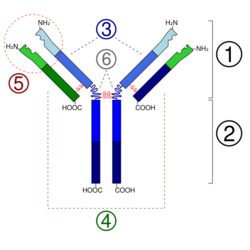Biology:Paratope

1. Antigen-binding fragment (Fab)
2. Antibody crystallizable region (Fc)
3. Heavy chains
4. Light chains
5. Variable region of the antibody. The paratope is the key-shaped section that makes direct contact with the antigen.[1]
6. Hinge regions
In immunology, a paratope, also known as an antigen-binding site, is the part of an antibody which recognizes and binds to an antigen.[1][2] It is a small region at the tip of the antibody's antigen-binding fragment and contains parts of the antibody's heavy and light chains.[1][2] Each paratope is made up of six complementarity-determining regions - three from each of the light and heavy chains - that extend from a fold of anti-parallel beta sheets.[2] Each arm of the Y-shaped antibody has an identical paratope at the end.[2]
Paratopes make up the parts of the B-cell receptor that bind to and make contact with the epitope of an antigen.[2] All the B-cell receptors on any one individual B cell have identical paratopes.[2] The uniqueness of a paratope allows it to bind to only one epitope with high affinity and as a result, each B cell can only respond to one epitope. The paratopes on B-cell receptors binding to their specific epitope is a critical step in the adaptive immune response.
Design of paratopes between species
The design and structure of paratopes can differ greatly between different species. In jawed-vertebrates, V(D)J recombination can result in billions of different paratopes.[3][4] The number of paratopes, however, is limited by the composition of the V, D, and J genes and the structure of the antibody.[3] Thus, many different species have developed ways to bypass this restriction and increase the diversity of possible paratopes.
In cows, an extra-long complementarity-determining region is considered to have an essential role in diversifying paratopes.[3][5] Additionally, both chickens and rabbits use gene conversion to increase the number of paratopes that are possible.[3]
References
- ↑ 1.0 1.1 1.2 "Paratope" (in en). Encyclopedia of Systems Biology. New York, NY: Springer. 2013. pp. 1632–1633. doi:10.1007/978-1-4419-9863-7_673. ISBN 978-1-4419-9863-7.
- ↑ 2.0 2.1 2.2 2.3 2.4 2.5 Kuby immunology (Eighth ed.). New York. 2019. ISBN 978-1-4641-8978-4. OCLC 1002672752.
- ↑ 3.0 3.1 3.2 3.3 "Structural and genetic diversity in antibody repertoires from diverse species". Current Opinion in Structural Biology 33: 27–41. August 2015. doi:10.1016/j.sbi.2015.06.002. PMID 26188469.
- ↑ "The origins of vertebrate adaptive immunity". Nature Reviews. Immunology 10 (8): 543–53. August 2010. doi:10.1038/nri2807. PMID 20651744.
- ↑ "Reshaping antibody diversity". Cell 153 (6): 1379–93. June 2013. doi:10.1016/j.cell.2013.04.049. PMID 23746848.
 |
